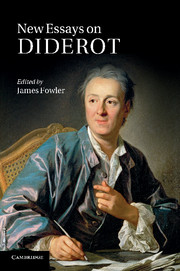Book contents
- Frontmatter
- Contents
- Notes on contributors
- Acknowledgements
- List of abbreviations
- Introduction
- PART I DIDEROT THE PHILOSOPHE
- 1 Diderot and the ancients
- 2 Diderot's earlier philosophical writings
- 3 The Encyclopédie: innovation and legacy
- 4 Diderot, Rousseau and the art of craft
- 5 Diderot's anti-colonialism: a problematic notion
- 6 Diderot's letters to Sophie Volland
- PART II NOVELS
- PART III DIALOGUES
- PART IV PLAYS AND DRAMATIC THEORY
- PART V MUSIC, PERFORMANCE, AESTHETICS
- Select bibliography
- Index
4 - Diderot, Rousseau and the art of craft
Published online by Cambridge University Press: 11 April 2011
- Frontmatter
- Contents
- Notes on contributors
- Acknowledgements
- List of abbreviations
- Introduction
- PART I DIDEROT THE PHILOSOPHE
- 1 Diderot and the ancients
- 2 Diderot's earlier philosophical writings
- 3 The Encyclopédie: innovation and legacy
- 4 Diderot, Rousseau and the art of craft
- 5 Diderot's anti-colonialism: a problematic notion
- 6 Diderot's letters to Sophie Volland
- PART II NOVELS
- PART III DIALOGUES
- PART IV PLAYS AND DRAMATIC THEORY
- PART V MUSIC, PERFORMANCE, AESTHETICS
- Select bibliography
- Index
Summary
Diderot to Rousseau: as social to solitary, atheist to believer, urban to rustic, progressive to primitive, bon viveur to ascetic, mechanist to Luddite, matter to spirit? There is some truth in these antitheses, though none reflects a straightforward reality. An article written by Jean Fabre nearly half a century ago drew attention to the common principles that underlay an apparently oppositional relationship, focusing primarily on philosophical matters. But there is another avenue worth exploring in connection with the rapport between these ‘frères ennemis’. It generates a new set of contrasts – between dexterity and genius (or hand and mind), deed and thought, fact and fancy – that on further scrutiny resolve into a kind of likeness; but its origins lie far back in the lives of both men.
Diderot's daughter Mme de Vandeul relates how in his early youth the future philosophe declared that he wished to abandon his studies. His cutler father (Didier) put him to work making knives and other instruments. After four or five days during which Denis ruined many pieces, he decided to resume his education, declaring: ‘J'aime mieux l'impatience que l'ennui.’ (‘I prefer impatience to boredom.’) He had clearly changed by the time he came to edit the Encyclopédie, for which he wrote a number of entries on the crafts, including ‘Coutelier’ (‘Cutler’). This new Diderot was so determined to gain first-hand experience of different trades that he visited workshops, consulted artisans, operated their machines and used their tools, almost – as he notes in the Prospectus to the Encyclopédie – becoming an apprentice himself.
- Type
- Chapter
- Information
- New Essays on Diderot , pp. 59 - 73Publisher: Cambridge University PressPrint publication year: 2011



